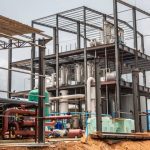Ondo State Governor, Mr. Rotimi Akeredolu has said that the proposed ethannol project in Okeluse town, Ose Local Government Area of the state is expected to create not less than one million jobs for the people of Ondo.
The project , according to him is expected to commence before the end of this year 2018.
Governor Akeredolu stated this at the dedication of the Ondo State Fadama III additional financing award of excellence to the state government in Akure, the state capital.
Akeredolu, who was represented by his Special Adviser on Agriculture and Agric-business, Mr Akin Olotu, explained that the ethanol project was designed to be the biggest project in the South-West, adding that it was a partnership between the state and the Nigerian National Petroleum Corporation.
The governor said, “It is on 15,000 hectares of land and our technical partners from China are already on ground; the factory is already designed; it is just to move it down here and the ground breaking ceremony will hold in November.
“Our farmers will be adequately engaged. On daily basis, we shall need cassava coming from 48 hectares at 30 tonnes production. That means the factory will require 30 multiplied by 48 tonnes of cassava on daily basis. By the time this starts, cassava will become a hotcake in the state.
“This will adequately solve the problem the cassava farmers are facing in the state. Clearing of the site will start by next week. In terms of job creation, by the time the work begins, by our projection, one million jobs will be created directly and indirectly. We are also looking at the impact on the housing, transformation and renewable energy, and I am sure people will celebrate this project.”
Earlier in his remarks, the state Project Coordinator for the Fadama III, Mr Olusiji Olatunji, said the project had already impacted on the lives of the farmers in the state in terms of productivity and income earnings.
“The income of the beneficiaries (farmers) has been increased. We are able to have average of 24 tonnes of cassava from 18 tonnes we used to have before. Before, the farmers used to have 1. 45 tonnes per hectare, but now, they are returning 4.5 tonnes of cassava per hectare.”














